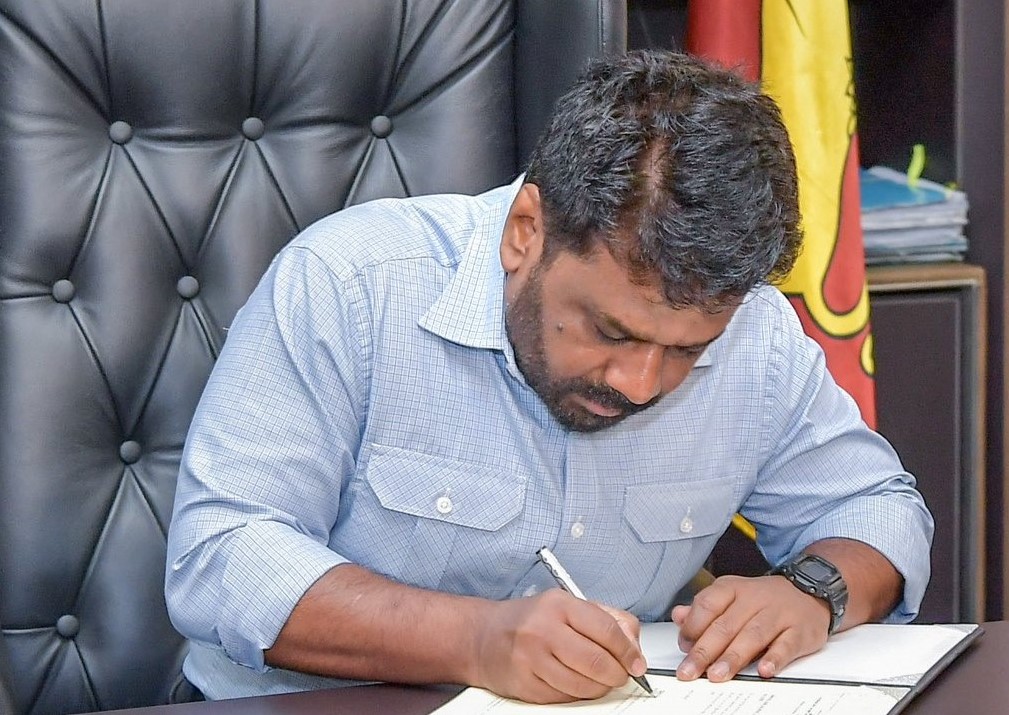President Dissanayake’s Marxists Janatha Vimukthi Peramuna (JVP)-led ruling National People’s Power (NPP) recorded a landslide victory, winning 159 seats in the 225-member parliament.
The election saw ethnic majority Sinhalese along with minority Tamils and Muslims voting for the NPP, which campaigned for “Fill parliament with compass”.
Compass is the symbol of NPP.
For the first time in history, Sri Lanka saw all Tamil-dominated Northern districts and Muslim-dominated Eastern districts backing the NPP as much as Sinhalese-dominated Southern districts.
Dissanayake’s leadership marked a pivotal shift in Sri Lanka’s political landscape, bringing hope of unity to the nation long divided by ethnic tensions, analysts say.
His campaign for reforms, economic recovery, equitable governance, and social justice has united the country’s different ethnicities around a shared vision.
WEAK OPPOSITION
However, the move has inadvertently weakened the opposition, setting a precedent that may shape Sri Lankan politics for years amid threats to the island nation’s fragile democracy.
The NPP is the first party to have won two-third majority under proportional representation (PR) system since it was implemented in 1989.
Both former presidents Mahinda Rajapaksa (2010-2015) and his brother Gotabaya Rajapaksa (2020-2022) secured two-third majority with the support of other minority political parties in the parliament.
However, Sri Lanka has experienced weaker opposition and democracy when there had been two-third majority in the parliament in the past.
Mahinda Rajapaksa government removed a chief justice when his government’s poverty alleviation programme was resisted and removed the limit for presidential term using the special majority. His administration also weakened independent institutions through a constitutional amendment.
His brother Gotabaya’s government repeated the same when he had the special majority before he was forced to flee the country in the face of mass protests in 2022.
Diverse Sri Lankan communities see President Dissanayake’s political dialogue as an inclusive platform of reconciliation and genuineness.
His reputation as a tireless campaigner against corruption, social inequality, and economic mismanagement resonated widely across the ethnic divide.
Unlike many of his predecessors, who often stoked nationalist fervor to galvanize their base, Dissanayake’s campaign focused on bridging the gap between communities.
He actively engaged with historically marginalized groups, offering them a seat at the decision-making table and promising tangible reforms that prioritized social and economic equity over divisive rhetoric.
YEARS OF HARD WORK
This strategy, however, did not happen in a vacuum. It was built on years of groundwork by Dissanayake’s political allies in the JVP and aligned civil society organizations.
The outreach to Tamil and Muslim communities, alongside broader progressive Sinhalese constituencies, helped craft an image of a government genuinely invested in the country’s diversity.
His government pushed initiatives for Tamil reconciliation, promoted Muslim rights without capitulating to sectarian pressures, and encouraged dialogue forums to address historic grievances.
Such inclusive politics transformed Dissanayake from a niche leftist leader into a nationally unifying figure.
However, this surge in broad-based support fragmented and weakened the opposition, the election results showed.
Traditional political rivals, including those from the center-right Samagi Jana Balawegaya (SJB) and factions of the nationalists Sri Lanka Podujana Peramuna (SLPP), struggled to maintain their identity and relevance.
The SLPP, once a dominant nationalist force in the last parliamentary polls, found itself unable to pivot from its prior nationalist agenda to compete in the new political climate. It won only three seats in the parliament.
With Dissanayake championing unity, moderate opposition leaders appeared less distinct and failed to capture public attention or differentiate themselves from the President’s transformative platform.
This weakened opposition landscape was further marred by internal divisions and ineffective coalition-building.
Efforts to unite disparate groups against the President’s coalition floundered, primarily due to lack of a cohesive vision and internal power struggles.
Some factions resorted to the familiar playbook of ethnic polarization, but these messages fell flat against Dissanayake’s genuine outreach and the tangible benefits his policies began to deliver.
Younger voters, especially, gravitated toward his more inclusive, reformist agenda, leaving traditional parties scrambling for relevance.
The consequence was a fragmented and weakened opposition, unable to pose a significant challenge to Dissanayake’s dominance.
Political analysts are of the view that such consolidation of power comes with risks.
A diminished opposition risks undermining democratic accountability, leading to potential policy stagnation, and less effective checks on executive power.
As President Dissanayake’s administration continues its reform agenda, the challenge will be maintaining the balance between unity and power consolidation, ensuring the pluralism that elevated him to power does not give way to political complacency. (Colombo/November 15/2024)
By Shihar Aneez / EN
